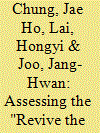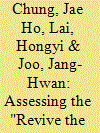| Srl | Item |
| 1 |
ID:
089394


|
|
|
|
|
| Publication |
2009.
|
| Summary/Abstract |
This article, focusing on the "revive the northeast" programme, examines four questions: why was the northeast region selected as yet another macro-site for Beijing-endorsed scheme of regional development; how does it differ from the "develop the west" scheme; what does the "revive the northeast" scheme entail in concrete policy terms; and how can we assess the impact of this scheme on the region's economic development? While it offers a relatively positive assessment of the programme's impact in facilitating a faster growth during 2004-06, future challenges are also noted for a sustainable development of the northeast region as a whole.
|
|
|
|
|
|
|
|
|
|
|
|
|
|
|
|
| 2 |
ID:
089422


|
|
|
|
|
| Publication |
2009.
|
| Summary/Abstract |
This article, focusing on the "revive the northeast" programme, examines four questions: why was the northeast region selected as yet another macro-site for Beijing-endorsed scheme of regional development; how does it differ from the "develop the west" scheme; what does the "revive the northeast" scheme entail in concrete policy terms; and how can we assess the impact of this scheme on the region's economic development? While it offers a relatively positive assessment of the programme's impact in facilitating a faster growth during 2004-06, future challenges are also noted for a sustainable development of the northeast region as a whole.
|
|
|
|
|
|
|
|
|
|
|
|
|
|
|
|
| 3 |
ID:
121737


|
|
|
|
|
| Publication |
2013.
|
| Summary/Abstract |
In this study I establish a universal typology of Chinese political elites and trace the elites' transformation by analyzing the demographic and sociopolitical composition of the Chinese Communist Party's Central Committee. The data set comprises the full and alternate membership of the Central Committees, from the First (1921) to the Seventeenth (2007). China's political elites started out as ideology-oriented/replacement types with strong unity, low differentiation, and wide circulation through radical methods. However, they have evolved into fragmented/reproductive types with weak unity, high differentiation, and narrow circulation through moderate methods.
|
|
|
|
|
|
|
|
|
|
|
|
|
|
|
|